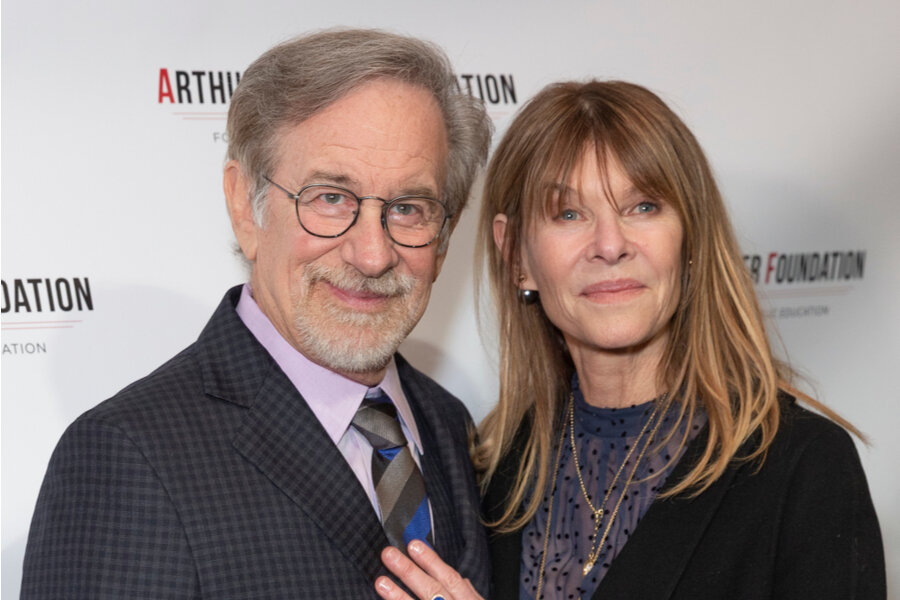A Look at Steven Spielberg and Kate Capshaw’s Support for Jewish Causes and Social Justice
/Steven Spielberg and Kate Capshaw. lev radin/shutterstock
Some serious wealth has emerged in the entertainment and sports industries in recent decades, and many top figures in this sector are engaged in philanthropy. Not all of them have the same kind of money, however, and not all give at the same level. In Hollywood, hyphenates are now the name of the game, and auteurs who have multiple arrows in their filmmaking quiver can sometimes soar highest, financially speaking.
Consider Steven Spielberg, who, all the way back in 1968, released his first film, “Amblin’.” Set during the hippie era, the short film, shot on 35 mm, became the name of Spielberg’s storied production company, Amblin Entertainment. In 1994, he co-founded DreamWorks studios with Jeffrey Katzenberg and David Geffen. And the three-time Academy Award-winning director’s films have grossed more than $10.1 billion worldwide.
Can you tell I’m a fan yet?
For all his efforts, the director-producer-writer is worth $3.7 billion and has been engaged in serious philanthropy since the 1990s. Back in 1995, he and his wife, actor Kate Capshaw, founded the Righteous Persons Foundation (RPF), which is dedicated to supporting efforts that build a vibrant, just and inclusive Jewish community in the United States. Spielberg also moves philanthropy through the lower-profile Wunderkinder Foundation, though to be fair, the director himself probably hasn’t been referred to as a wunderkind since E.T. phoned home.
Spielberg, 74, still has plenty of money waiting in the wings, and the asset base of the Wunderkinder Foundation in particular—above $110 million in recent years, according to tax records—speaks to a philanthropic story that is still very much being written. But what has the Hollywood legend actually funded, and what can we expect down the line? Here’s a quick rundown:
Jewish causes are a top interest
Moved by his experience directing the seminal 1993 film “Schindler’s List,” Spielberg donated his portion of the film’s profits to support the Jewish community. He established the Righteous Persons Foundation, which has made more than $100 million in grants. RPF has been supported by additional profits from the films “Munich” and “Lincoln.”
A big early philanthropic project for Spielberg and Capshaw was establishing the Institute for Visual History and Education, now known as the USC Shoah Foundation. The organization produces and preserves video interviews with survivors and other witnesses of the Holocaust. The institute houses nearly 55,000 audio-visual testimonies conducted in 65 countries and in 43 languages. Rwandan testimonies were added to the Visual History Archive and IWitness educational website in 2013.
Through RPF, the couple recently made a $100,000 gift to Dayenu: A Jewish Call to Climate Action, supporting its work organizing at the intersection of climate action and racial and economic justice. RPF has supported the Anti-Defamation League (ADL), giving a $150,000 renewal grant to support the Center on Technology and Society, ADL’s Silicon Valley-based initiative that educates and works alongside executives and engineers from companies including Facebook, Google and Microsoft to tackle cyberhate.
They’ve also backed the American Jewish Historical Society and OneTable, which is dedicated to spreading the practice of Shabbat dinner.
Spielberg’s work in this area is unsurprisingly engaged in film and media, as well. The foundation has supported Jewish Story Partners, which cultivates and funds independent Jewish-themed films, series and short-form content.
A broader social justice mission
Through the years, RPF has embraced a broader social justice mission, and one that is even intersectional. In a year of renewed calls for social justice, RPF doubled down on organizations working toward racial justice in the Jewish community, renewing grants with the Jews of Color Initiative, the Collaborative for Jewish Organizing, and Bend the Arc.
The foundation also made a $100,000 grant to Western States Center, whose work includes helping social justice organizations understand how anti-Semitism animates white nationalism, and the ways in which anti-Semitism and other forms of racism are thus inextricably linked.
Another intriguing grant made to the New Venture Fund, meanwhile, supports the Safety Respect Equity Coalition (SRE), which works to create equitable Jewish workplaces and communal spaces during the #MeToo Movement. Other recent grantmaking reflects an interest in women’s rights and reproductive justice.
Finally, through Wunderkinder Foundation, the couple has also supported places like Equal Justice Initiative and Human Rights Watch.
Other interests include the arts and health
Many philanthropists have a passion for the arts. In contrast to donors from other sectors like Wall Street or Silicon Valley, however, Glitzy Givers have made their living in the arts, and are interested in empowering the next generation of creators, artists and storytellers. Spielberg has made grants to Geffen Playhouse, Juilliard School and the Shakespeare Center of Los Angeles.
On the health front, Cedars-Sinai Medical Center in West Hollywood is home to the Steven Spielberg Building, a home for pediatric medicine. Via the Wunderkinder Foundation, Spielberg has supported medical research at places like American Heart Association, Children’s Diabetes Foundation, Planned Parenthood of Los Angeles, Teddy Bear Cancer Foundation and the UCLA Foundation.
***
Spielberg’s foundations are steered by a handful of board members and staff. Righteous Persons Foundation has an accessible website with a clear grant application process. Wunderkinder Foundation keeps a much lower profile. One of its notable board members is Gerald Breslauer, a top Hollywood financial adviser.
With a serious track record of philanthropy and billions still at the ready, this is a Hollywood couple to watch going forward, particularly in the realm of Jewish causes and social justice. As for predicting the next move for Spielberg’s philanthropy, I leave you with a memorable line from “Minority Report”: “The precogs are never wrong. But occasionally... they do disagree.”









